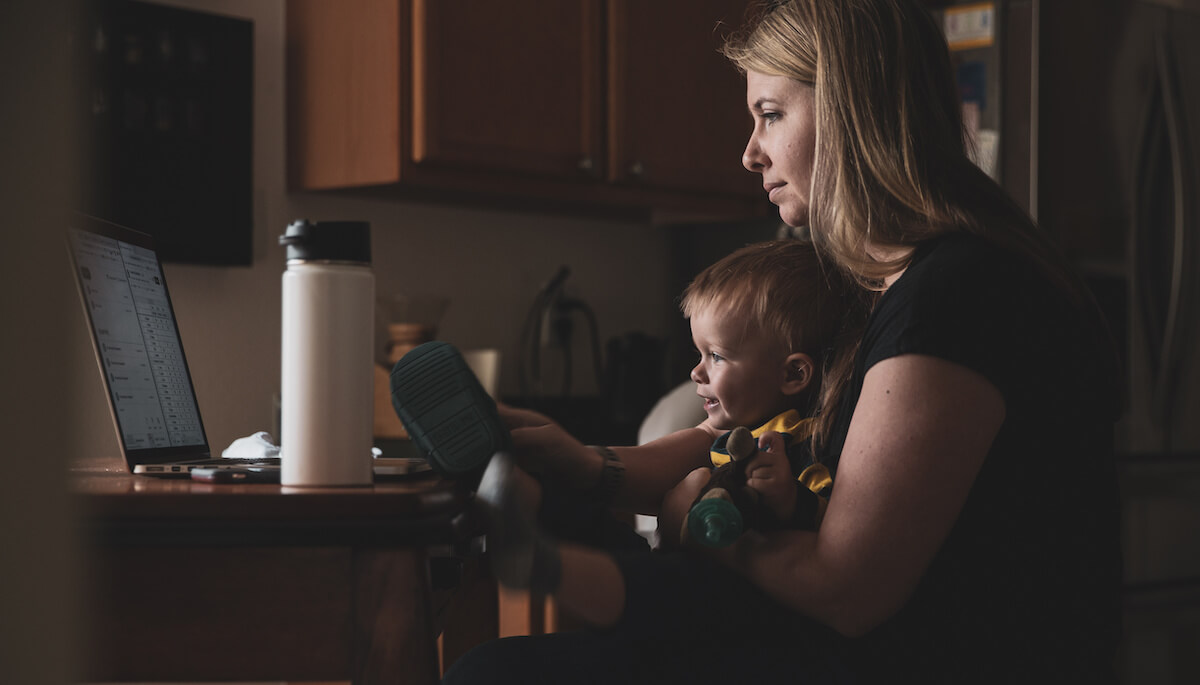Do you struggle to focus while working at home
If so, you're not alone.
When your workplace is also your home, staying on task can be challenging. So many temptations can pull you away from your computer screen — Netflix, the pantry full of snacks, and the lure of a nap. And when you're feeling like procrastinating, even the laundry sounds like a good option.
When you actually sit down to work, it's easy to wander off task when no one is around to hold you accountable. You may even be reading this article right now while you should be working. (But don't go anywhere, this is way more helpful than browsing memes.)
A focus boost is essential for all remote workers from time to time, regardless of how long they've been working from home. Thankfully, it's possible to replicate the same productive environment we're used to at the office. Learn how to stay focused working from home with a few easy strategies you can start implementing right now.
But first, let's explore why people might have a more challenging time staying focused while working from home.
The Challenge of Staying Focused on Work at Home

Whether you work in an office or at home, it can be challenging to stay focused during the workday. At the office, water cooler chatter and interruptions by coworkers can be distracting, not to mention the surprise meetings that can crop up at any time. But at the office, the very presence of these same colleagues can also help keep you on track and accountable.
But when you work from home, it's much easier to stray off task. Although you can't deny the positives (pajamas and tea, anyone?), it can be tough to enjoy remote work when there are many obstacles in your way.
One of those obstacles is obvious — distractions. Even though distractions can happen anywhere, the possibilities increase when your workplace is also your home. Family members, pets, or even household tasks can be major sources of distraction that cause you to lose your focus.
The chances increase if you have children. One survey found that those with two or more children at home experienced a higher level of distraction and negative mental health effects.
The absence of set boundaries between work and home can also make it hard to concentrate. Working in an office makes it easy to leave work behind at the end of the day and move forward with your personal life. But when your workplace is also your home, it's easy to start feeling the “work creep.” Before you know it, you're working longer hours, and it feels like you're always on the clock.
Also, some of us simply find it more difficult to focus when we're not in a traditional work environment. Those who didn't choose to work from home or were moved out of the office by their employer may be particularly affected by a change in environment. Although the coffee shop, your kitchen table, or even your couch sound great in theory, many find it hard to be sustainable without more structure.
Plenty of other elements factor into decreased focus while working from home — do barking dogs or Amazon deliveries sound familiar? Whatever the source, the important thing is to recognize when you're struggling. If you find your attention span waning, it's time to take control of your workday.
Discover How to Stay Focused Working From Home With These 7 Tips

Whether you're just starting out with working from home or have been doing it for a while, the key is staying focused and not getting burnt out. It is possible to make remote work a success with a few simple and effective strategies.
Here are a few tips on how to stay focused working from home.
1. Optimize Your Workspace
Setting yourself up for a successful remote day starts with a dedicated workspace. It doesn't need to be an elaborate or expensive setting, just somewhere you can sit without being distracted. Sorry, but this means no working from bed.
If you don't have a home office, try setting up a workstation in your living room or kitchen. Get creative if your space is small. For example, you can use a folding table as a desk or set up a makeshift standing desk.
However, if there will be other people at home while you’re working, try to avoid common areas. This will reduce distractions to help you stay focused and will also be appreciated by your family or roommates. Look for a nook if you're not sure where you can set up your own space. Usually, there's an unused place somewhere, such as a recessed area or awkward corner.
Wherever your space is, make sure it is comfortable and ergonomic. Declutter your area and keep only the essentials within reach. Use a chair with good back support, and place your monitor at eye level to avoid neck and back pain.
2. Learn Your Personal Productivity Times
Another pro tip for maximizing your focus is discovering your personal productivity times. Everyone has different hours when they do their best work, and it's essential to find what works for you.
If you're a morning person, take advantage of that and start your work as soon as you wake up. The amount you can accomplish before your lunch break will surprise you. On the other hand, if you're more productive in the evening, plan for easier tasks earlier and save your deep focus work for later work sessions.
Try tracking your time with Rize if you're unsure. You can use a time tracker to figure out when you do your best work and when you're most focused. Once you're aware, you can rearrange your workday (as much as possible) for set times that match your focus zones.
3. Schedule Your Day (and Your Tasks)
Sticking to a work-from-home schedule will help you find your focus at any time of day. When you don't have set office hours, it's easy to start working at all hours of the day and night. But this can cause overworking, making it hard to focus and eventually leading to burnout.
If you create a daily schedule and follow it, your brain will learn when to work and when to relax. Additionally, scheduling your tasks ensures you have ample time to focus on your priorities. Combining these with effective time management techniques can help you avoid burnout and maximize your focus.
There are many methods to help you schedule your day and manage your time. One popular technique is the Pomodoro method. This involves working in 25-minute intervals followed by five-minute breaks. Take a longer break of 20-30 minutes after four “Pomodoros.” Other well-known scheduling methods include time blocking, Eating the Frog, and Getting Things Done.
A popular approach to scheduling your tasks is the Eisenhower Box. This technique uses a simple two-by-two grid to help you prioritize your tasks by urgency and importance. Tasks are then scheduled based on their priority in the matrix.
Scheduling your day and tasks is a personal process, so experiment with different techniques until you find what works for you. And once you do, try to stick to it as much as possible.
4. Start Your Day With Intention
Another great way to stay focused throughout the day is to begin your workday with a morning routine. An intention-setting morning ritual is a mindful way to help you prepare for the day ahead.
Intention setting can take any form you choose — a ritual is merely a series of actions you perform in a specific order. The more you practice this routine, the more it becomes a habit.
Performing the same acts as a routine every morning has many benefits. A set routine can trigger your mind to the start of the workday. Being intentional and laying out your tasks helps you focus your work, which results in getting more done and prevents you from feeling overwhelmed later in the day.
There are many different ways you can create a morning ritual. It may be as simple as a specific routine of getting dressed, sitting down at your desk, turning on a preset playlist or podcast, and reviewing your task manager. Or maybe it looks more like sitting in the same spot at your favorite coffee shop, ordering the same latte, and journaling your intentions for a few moments.
Whatever your morning routine looks like, practice it intentionally and consistently. The power of habit can go a long way to increase focus and productivity.
5. Manage Distractions

As any remote worker knows, distractions can be a real issue when working from home. Whether it's the never-ending list of chores or the siren call of the social media scroll, our attention is spread thin when we're trying to focus.
While we can't always control our environment, there are things we can do to manage distractions. One way is to set boundaries with our loved ones on when, where, and how we work. If you have kids at home, for example, let them know that mom or dad is working during certain hours and shouldn't be disturbed unless it's an emergency.
If you find yourself getting pulled into phone calls, redundant Zoom meetings, or other online distractions, some great tools and apps can help. There's no shame in using focus tools to support your efforts — the internet is literally designed to be a dopamine slot machine, so the addiction is real.
In fact, it keeps a hold on us even when we aren't actively using it. Research has shown that simply having your phone nearby can be enough to decrease your attention span and lower your performance. The same is true for apps like email and Slack for your team.
Tracking your time with Rize can help you see how focused you are while working and identify which apps or websites interrupt you the most. Then, you can make a plan to stop them by using app blockers or other techniques.
And if you just can't seem to resist the pull of your smartphone, physically remove it from your surrounding space. The same study above showed that physically distancing yourself from your phone decreases its cognitive load on your brain.
6. Make Sure to Schedule Breaks
When we're trying to focus, it's easy to get wrapped up in the task and forget to take a break. But breaks are essential for our health and well-being.
When we sit for long periods, our bodies shut down — blood flow slows, muscles tighten, and we become more susceptible to injury. Taking regular breaks helps to counteract these effects. Breaks also help you increase concentration. Studies show that taking breaks throughout the workday of anywhere from five to 60 minutes helps you remain focused and energized.
Schedule breaks periodically throughout your workday. When it's time to pause, choose activities that give your mind a break and allow you to breathe deeply, move your body, or "zone out" on purpose. Here are a few ideas:
- Meditate
- Have a quick dance party
- Practice a deep-breathing exercise
- Allow yourself to daydream or doodle
- Listen to music
- Stretch and move your body
- Have a healthy snack
And if you can, step outside for some fresh air. Nature has been shown to improve focus and mood, so even a brief break in the park or around your yard can make a big difference.
7. Achieve (and Maintain) a Healthy Work-Life Balance

Working from home has its perks — no commute, flexible hours, and you can wear whatever you want (yes, like those sweatpants). However, if you don't take precautions, it can also lead to burnout, something 69% of remote workers reportedly experienced in recent years. It's essential for your well-being to maintain a healthy work-life balance when working remotely, just as you would in an office setting.
That means setting boundaries between work and personal time (and enforcing them). Have a set start and end time for your workday, and when the day ends, make a point to disconnect from work altogether. Shut down your computer, turn off those email and Slack notifications, and close the door to your workspace if possible. Anything remaining can wait until the next day.
Remember, you're not living at your office — you're working from home. So although it's important to create a comfortable and conducive space to focus, it's also crucial to separate from it so you can relax and unwind when you're not working.
Find Your Work-from-Home Focus and Get Things Done
At some point, we all struggle to focus while remote working. It doesn't matter if it's your first day working from home or your hundredth. You can learn how to stay focused working from home by following the tips above and developing a productive routine that works for you.
Start with small changes and see how they impact your focus and productivity. A great way to start is with a free trial of Rize. Start tracking your time and see how much you are focusing during your workday. Rize can help you identify how and where you focus the best and what distracts you, so you can focus on what matters most.
